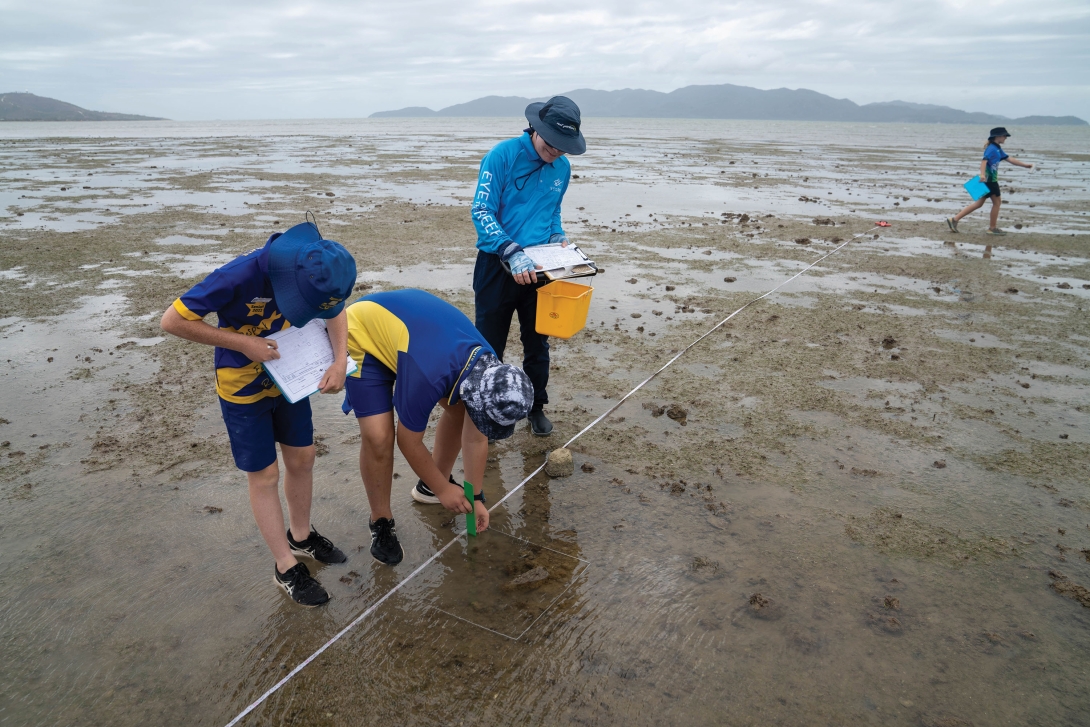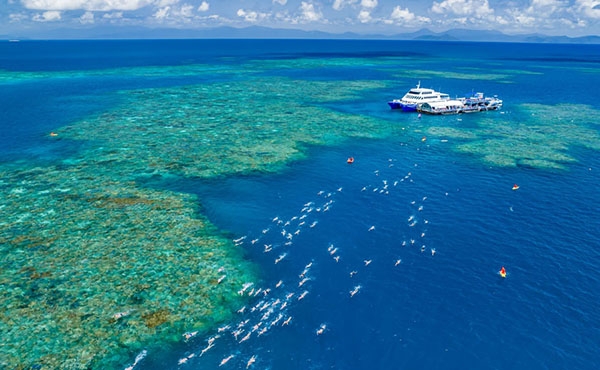The response of Reef organisms, particularly reef building corals, to climate change has continued to be an important area of active research. Its pertinence is highlighted by two mass coral bleaching events since 2019 that did not result in significant coral mortality.161 A key focus has been on identifying processes that support coral and coral reef habitat resilience. However, the effects of climate change and marine heatwaves on other organisms that maintain Reef resilience remain a key knowledge gap.
Since 2019, there has been an increased focus on developing methods that use artificial intelligence, environmental DNA (eDNA) and autonomous vessels to complement current monitoring programs (Section 6.2.3). Contributions to research by non-research institutions, including through citizen science, are also increasing, as are collaborations between research institutions, tourism operators, Reef managers, local community groups and Traditional Owners.1078,1390,1391
Research on interventions to support resilience has increased rapidly since 2019
From 2018 to 2020, the annual number of research permits operating in the Region increased from 219 to 335. This number has remained generally stable in 2021 and 2022.1392 In particular, research focusing on potential interventions that may support the ecosystem resilience of the Reef has increased rapidly since 2019.6,7 Largely driven by the implementation of the Reef Restoration and Adaptation Program (RRAP), this program is one of the largest coral reef restoration research initiatives globally (Box 5.4).32 The program has led to an accelerated research and development program that aims to develop, test and assess the risk of a suite of novel interventions that may contribute to the resilience of coral reefs. A number of coral intervention projects are underway across the Reef which are independent to the Reef Restoration and Adaptation Program.32 This research includes testing intervention approaches, which are novel to the Reef, at a local scale based on techniques initially developed and tested in the laboratory or in other marine environments overseas.32,1078
The primary focus of developing intervention methods has been on building the functional resilience of reef-building corals, but there is an emerging focus on other species or habitats, such as marine turtles, seagrasses and coastal ecosystems, particularly in relation to blue carbon opportunities.924,1393,1394
Box 5.4
The Reef Restoration and Adaptation Program
In 2018, the Australian Government funded the Reef Restoration and Adaptation Program consortium to determine the feasibility of intervening at scale on the Great Barrier Reef to help it adapt to, and recover from, the effects of climate change. The program scoped existing and novel approaches that could help support the resilience of the Reef. The feasibility study found no single silver bullet solution and delivered an investment case for further research and development of reef interventions. A range of methods are needed to work together to provide compounding benefits, along with ongoing best-practice Reef management and reducing carbon emissions.
The second phase of the Reef Restoration and Adaptation Program (2020 to 2024) is an accelerated research and development program into the prospective techniques. Since 2019, investigations have progressively developed and field-tested different technologies, including cooling and shading methods, assisted adaptation of Reef species, and supporting natural rehabilitation of damaged and degraded reefs. The program also includes complementary research across a range of subprograms, including assessing the feasibility of implementation at scale, modelling and decision support, and stakeholder engagement and regulation. The program has led to changes in the nature and scale of research conducted on the Reef.
The goal of the Reef Restoration and Adaptation Program is to provide reef managers and decision-makers with an innovative suite of safe, acceptable and cost-effective interventions. The next phase is envisaged to be an implementation phase that will overlap with the research and development phase as early as 2025, depending on the specific intervention. This implementation phase may include commercial transfer of some of the intervention measures, including the construction, operation and deployment of full-scale systems. In 2024, some uncertainty remains about the pathway to implementation. However, it should be underpinned by sound science, calibrated against a range of risk factors (including inaction), consider ethics and the social and cultural acceptability, and be cost effective.
A network of four island research stations continues to operate at Lizard Island, Orpheus Island, Heron Island and One Tree Island. This network continues to be integral to the conduct of research activities at these locations. Scientific Research Zones around these stations are intended to provide opportunities for scientific research to be undertaken in relatively undisturbed areas. In 2024, eight research institutions are accredited to undertake limited impact research without a permit.
The majority of permitted educational activities are focused on learning about the natural and cultural values within the Marine Park and associated field research methodologies. Approximately 66 permits were granted for education programs between July 2019 and September 2023. These educational programs are generally based at the island research stations. More than 60 per cent of these permits were for education classes visiting the Heron Island Research Station. Permitted educational activities also include courses for recreation or professional activities, such as sail training or occupational dive certification.1395

Management | The zoning plans and Marine Park regulations set out how research and educational activities are managed. Limited impact research and limited education programs may be conducted by accredited research institutions in accordance with the zoning plans and the Marine Park regulations. All other research and educational activities are managed through permits granted by the Reef Authority and the Queensland Parks and Wildlife Service.1395 The guidelines for Managing Research in the Great Barrier Reef Marine Park 1396 complement the statutory framework by providing further definitions, examples and best environmental practice guidance for researchers, particularly when conducting extractive research.
The Policy on Great Barrier Reef Interventions,1397 adopted in 2020, guides decisions on matters related to restoration and/or adaptation interventions that are designed to support and build ecosystem resilience and provide conservation benefits within the Marine Parks, including research into interventions. This policy is complemented by the Guidelines: Applications for restoration/adaptation projects to improve resilience of habitats in the Great Barrier Reef Marine Park.1398
Implementation of the Reef 2050 Integrated Monitoring and Reporting Program (RIMReP)1399 is designed to provide Reef managers with evidence-based information on condition (and trends in condition) of reef organisms and habitats, and to track progress against the objectives of the Reef 2050 Long-Term Sustainability Plan (Reef 2050 Plan) to protect the Reef. The managing agencies also publish science strategies to communicate priority research and information needs as well as drive outcomes that can inform evidence‑based decision-making.1386 For example, the Reef Authority’s Science and Knowledge Needs for Management details priority information needs for Reef management under four overarching themes. Since 2019, science strategies to inform management are increasingly embedding the importance of First Nations peoples’ research priorities, incorporating traditional knowledge and adopting a social–ecological systems approach to addressing priority information needs.1120,1386,1400
Citizen science is community participation and collaboration in scientific research. The Queensland Government published the Engaging Queenslanders in Science Strategy 2021–24 to foster science engagement, participation and innovation.1401 This includes increasing community participation in citizen science to grow scientific literacy and contribute to scientific discovery. Ten key principles guide best-practice citizen science contributions.1402 The Eye on the Reef program is the Reef Authority’s citizen science platform, enabling Reef visitors to be citizen scientists by contributing valuable information to management about reef health, wildlife and incidents. Other programs, such as the Great Reef Census, have directly contributed to management — for example, aiding in the selection of sites for crown-of-thorns starfish control.1380


